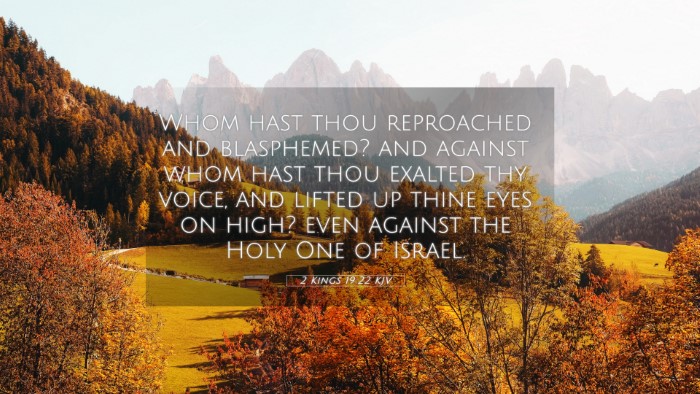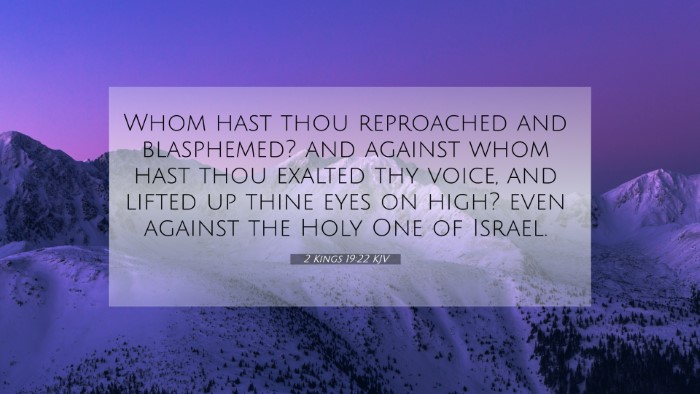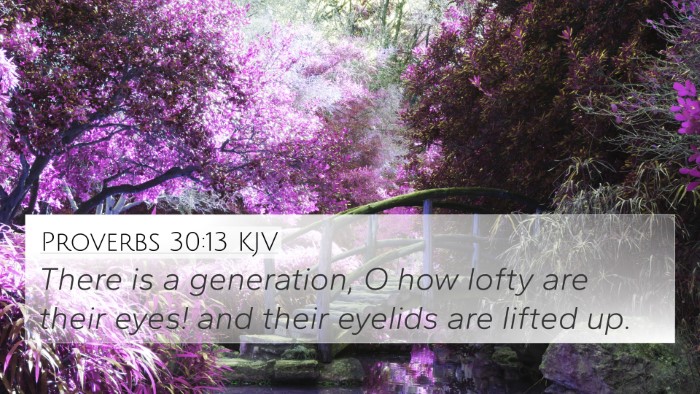This section features a detailed cross-reference designed to enrich your understanding of the Scriptures.
Below, you will find carefully selected verses that echo the themes and teachings related to 2 Kings 19:22 KJV. Click on any image to explore detailed analyses of related Bible verses and uncover deeper theological insights.
 Isaiah 5:24 (KJV) »
Isaiah 5:24 (KJV) »
Therefore as the fire devoureth the stubble, and the flame consumeth the chaff, so their root shall be as rottenness, and their blossom shall go up as dust: because they have cast away the law of the LORD of hosts, and despised the word of the Holy One of Israel.
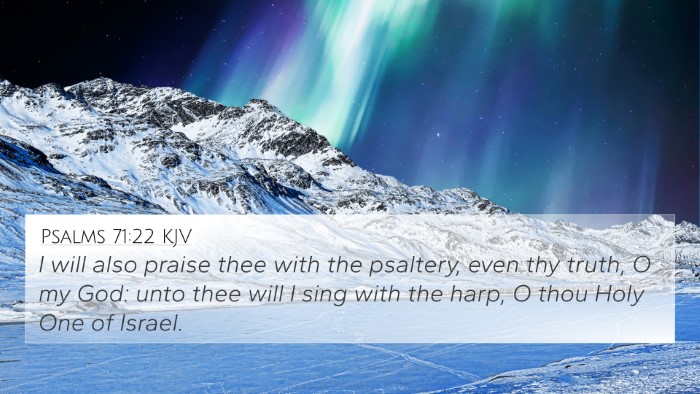 Psalms 71:22 (KJV) »
Psalms 71:22 (KJV) »
I will also praise thee with the psaltery, even thy truth, O my God: unto thee will I sing with the harp, O thou Holy One of Israel.
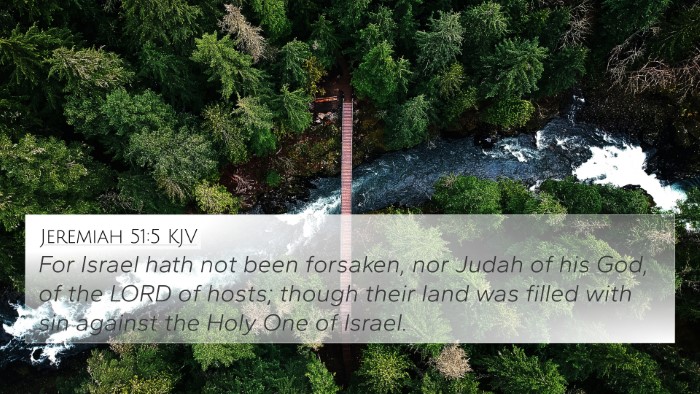 Jeremiah 51:5 (KJV) »
Jeremiah 51:5 (KJV) »
For Israel hath not been forsaken, nor Judah of his God, of the LORD of hosts; though their land was filled with sin against the Holy One of Israel.
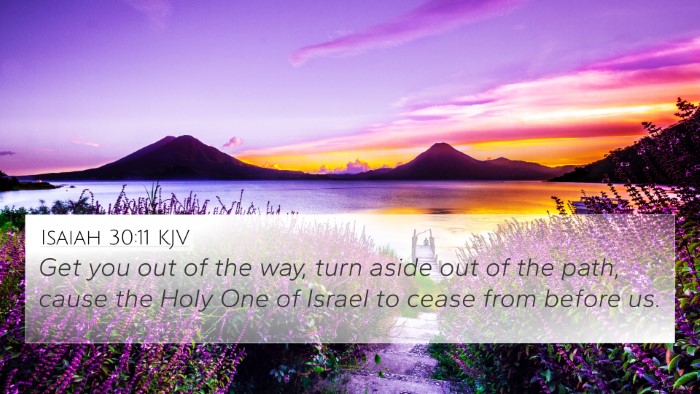 Isaiah 30:11 (KJV) »
Isaiah 30:11 (KJV) »
Get you out of the way, turn aside out of the path, cause the Holy One of Israel to cease from before us.
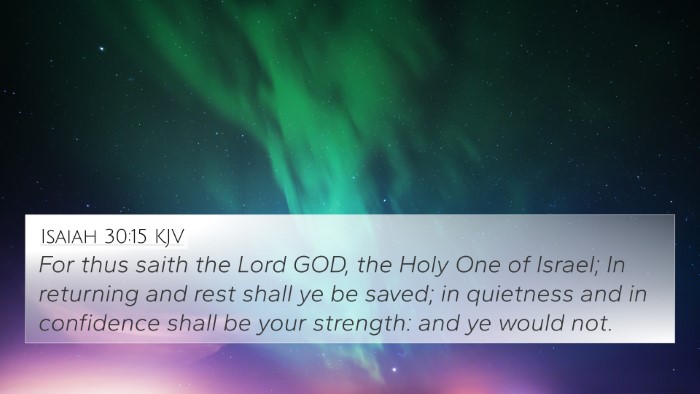 Isaiah 30:15 (KJV) »
Isaiah 30:15 (KJV) »
For thus saith the Lord GOD, the Holy One of Israel; In returning and rest shall ye be saved; in quietness and in confidence shall be your strength: and ye would not.
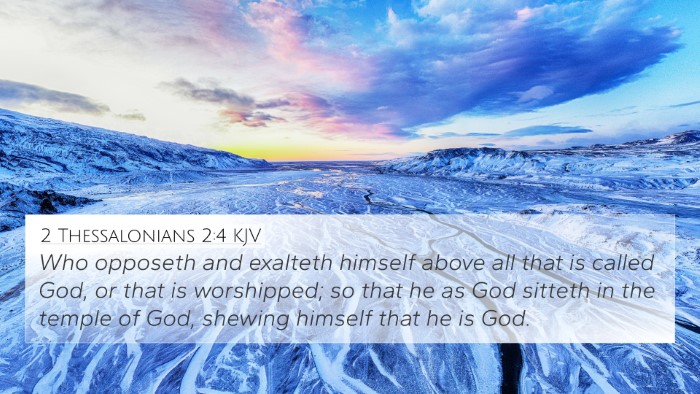 2 Thessalonians 2:4 (KJV) »
2 Thessalonians 2:4 (KJV) »
Who opposeth and exalteth himself above all that is called God, or that is worshipped; so that he as God sitteth in the temple of God, shewing himself that he is God.
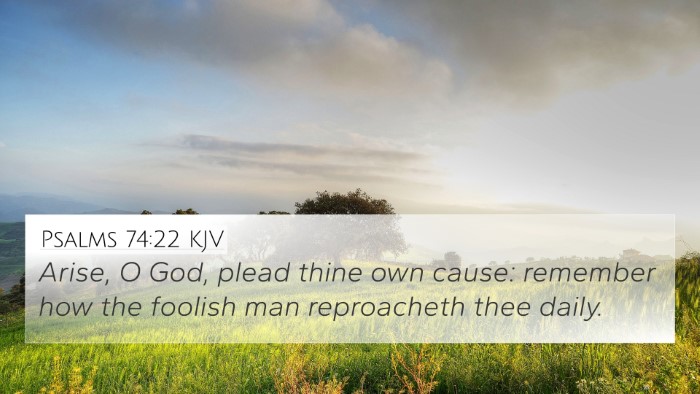 Psalms 74:22 (KJV) »
Psalms 74:22 (KJV) »
Arise, O God, plead thine own cause: remember how the foolish man reproacheth thee daily.
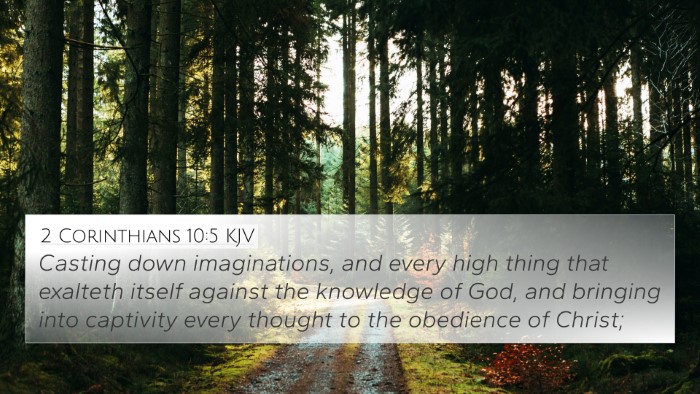 2 Corinthians 10:5 (KJV) »
2 Corinthians 10:5 (KJV) »
Casting down imaginations, and every high thing that exalteth itself against the knowledge of God, and bringing into captivity every thought to the obedience of Christ;
 Daniel 5:20 (KJV) »
Daniel 5:20 (KJV) »
But when his heart was lifted up, and his mind hardened in pride, he was deposed from his kingly throne, and they took his glory from him:
 Ezekiel 28:2 (KJV) »
Ezekiel 28:2 (KJV) »
Son of man, say unto the prince of Tyrus, Thus saith the Lord GOD; Because thine heart is lifted up, and thou hast said, I am a God, I sit in the seat of God, in the midst of the seas; yet thou art a man, and not God, though thou set thine heart as the heart of God:
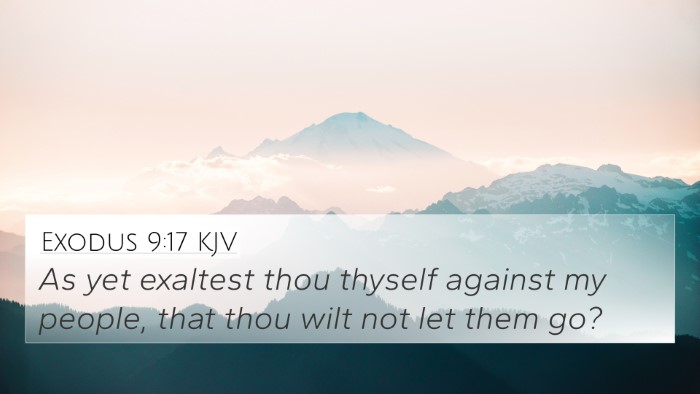 Exodus 9:17 (KJV) »
Exodus 9:17 (KJV) »
As yet exaltest thou thyself against my people, that thou wilt not let them go?
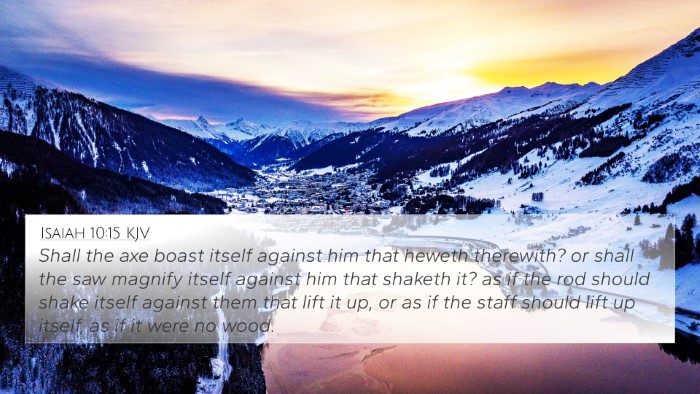 Isaiah 10:15 (KJV) »
Isaiah 10:15 (KJV) »
Shall the axe boast itself against him that heweth therewith? or shall the saw magnify itself against him that shaketh it? as if the rod should shake itself against them that lift it up, or as if the staff should lift up itself, as if it were no wood.
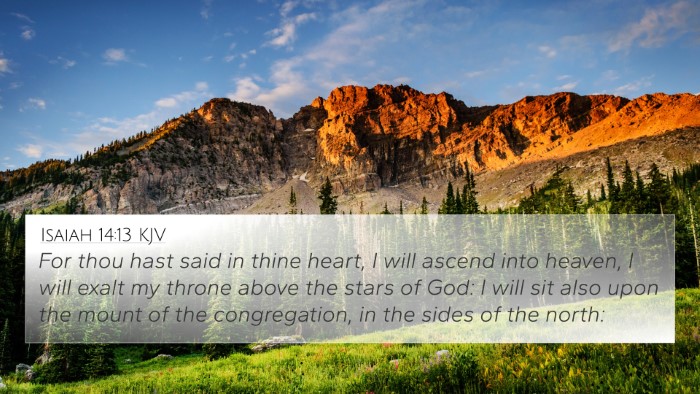 Isaiah 14:13 (KJV) »
Isaiah 14:13 (KJV) »
For thou hast said in thine heart, I will ascend into heaven, I will exalt my throne above the stars of God: I will sit also upon the mount of the congregation, in the sides of the north:
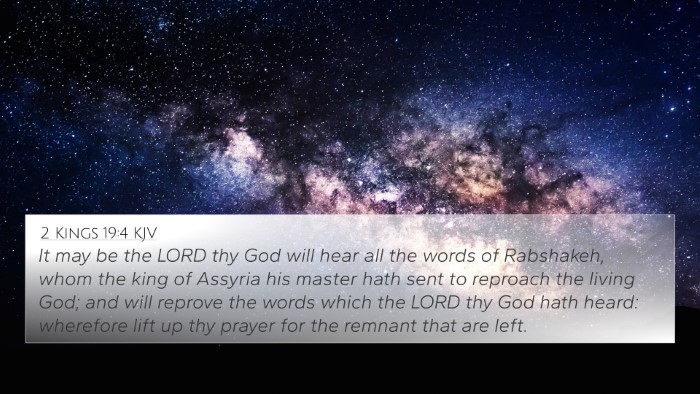 2 Kings 19:4 (KJV) »
2 Kings 19:4 (KJV) »
It may be the LORD thy God will hear all the words of Rabshakeh, whom the king of Assyria his master hath sent to reproach the living God; and will reprove the words which the LORD thy God hath heard: wherefore lift up thy prayer for the remnant that are left.
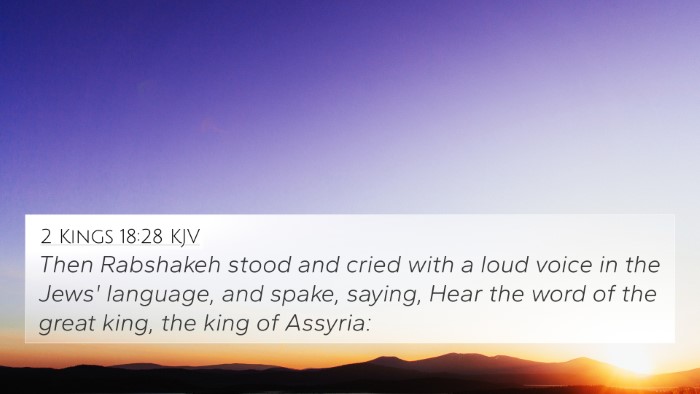 2 Kings 18:28 (KJV) »
2 Kings 18:28 (KJV) »
Then Rabshakeh stood and cried with a loud voice in the Jews' language, and spake, saying, Hear the word of the great king, the king of Assyria:
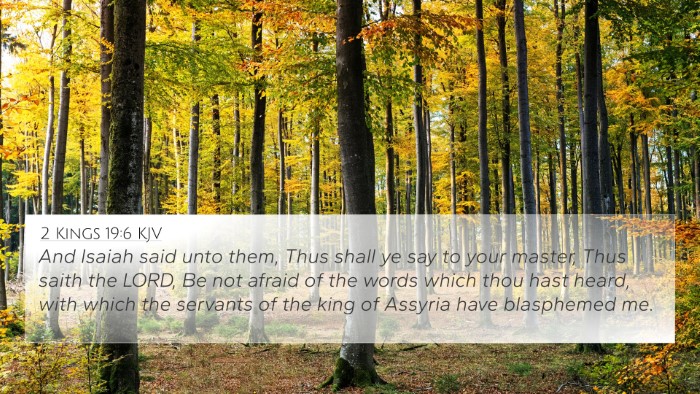 2 Kings 19:6 (KJV) »
2 Kings 19:6 (KJV) »
And Isaiah said unto them, Thus shall ye say to your master, Thus saith the LORD, Be not afraid of the words which thou hast heard, with which the servants of the king of Assyria have blasphemed me.
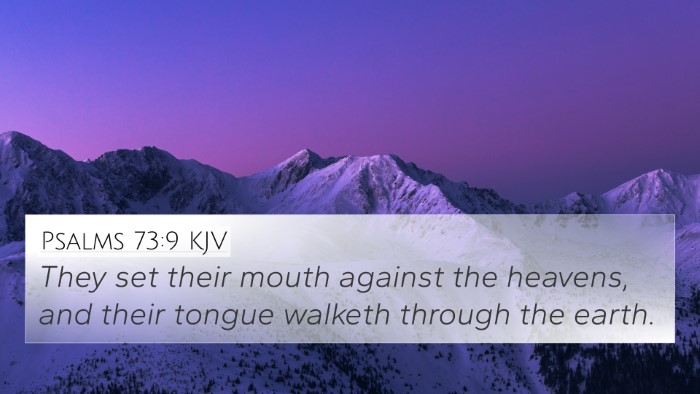 Psalms 73:9 (KJV) »
Psalms 73:9 (KJV) »
They set their mouth against the heavens, and their tongue walketh through the earth.
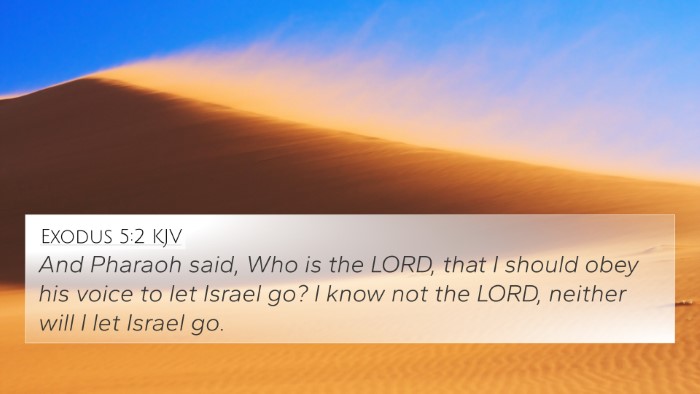 Exodus 5:2 (KJV) »
Exodus 5:2 (KJV) »
And Pharaoh said, Who is the LORD, that I should obey his voice to let Israel go? I know not the LORD, neither will I let Israel go.

